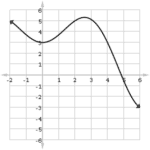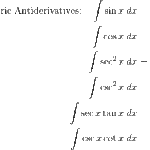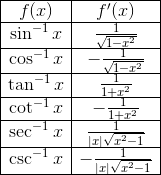Note: This article accounts for the latest revisions that will appear on the AP Calculus AB/BC Exams in May 2017.
As this article is long, here is a table of contents if you just want to learn something specific about the Exams:
- How You’re Assessed on the Exams
- Successful Time Management
- Test Content: Section I
- Multiple-Choice Questions
- Test Content: Section II
- Free Response Questions
- The End
How You’re Assessed on the Exam
As you might already know (or have guessed), AP Calculus BC is a step above AP Calculus AB. BC goes more in-depth with the learning objectives than AB. Despite these differences, the two courses focus on the same set of Big Ideas, with one key difference.
- Limits
- Derivatives
- Integrals and the Fundamental Theorem of Calculus
- Series (BC)
- AP Calculus BC goes a step further and requires students to master extra learning objective regarding series of numbers.
Each of these Big Ideas represent roughly 20 learning objectives. For AB students, that’s 60 total learning objectives. For BC students, that’s 80 total learning objectives. No matter which course you take, you have a challenge ahead of you.
Successful Time Management
In this section I will break down the length of the AP Calculus Exams, and offer suggestions on how to make sure you successfully finish each section of the exam. First a piece of recycled advice from my ACT articles: take multiple timed practice exams to become used to the exam’s format, content, and pacing. For students will a College Board account, a full-length practice exam is available for you to take right now.
BIG Note: The AP Calculus AB/BC Exams are IDENTICAL in structure.
Section I: Multiple Choice (45 Questions, 105 Minutes, 50% of Exam Score)
Section I is further broken down into two sections: Part A and Part B.
- Part A: 30 Questions, 60 Minutes
- No calculator allowed.
- Part B: 15 Questions, 45 Minutes
- You need a graphing calculator.
To break it down, in Part A you have two minutes to answer each question. In Part B you have 3 minutes to answer each question. That seems like a lot of time per question, but remember, this is Calculus we’re talking about. You’re going to need every second.
If you’re taking AP Calculus AB/BC, I bet you’ve already taken you’re fair share of high-stakes standardized tests. Even so, check out my article on ACT Time Management. The article goes over some simple tips and tricks that you can’t afford to miss on exam day.
Another thing to remember is that like all AP Exams, on Calculus AB/BC there is no penalty for guessing. That’s right; no points are deducted for incorrect answers. Why is that a good thing for you? Well, if there is a question or two where you get stuck, there is no shame in guessing and moving on. Just don’t leave any questions blank!
Break (10 Minutes)
Break is an important time during any AP Exam. But for a three-hour test like AP Calculus AB/BC, you’re only at the halfway mark. Go to the bathroom, drink a little water, and don’t forget to eat something. You’re going to need some fuel to finish strong.
Section II: Free Response (6 Questions, 90 Minutes, 50% of Exam Score)
Section II is further broken down into two sections: Part A and Part B.
- Part A: 2 Problems, 30 Minutes
- You need a graphing calculator.
- Part B: 4 Problems, 60 Minutes
- No calculator allowed.
Like many STEM AP Exams, Section II on the AP Calculus AB/BC Exams has a series of tasks contained in each question. In other words, each question will have part a, b, c, etc. Each task represents a chunk of your time. To keep a handle on time management, count the number of tasks you are required to do at the beginning of Section II. That way you know the exact amount of time you can dedicate to each task.
Another thing to remember before you go jumping into practice tests is that on certain parts of Sections I & II a graphing calculator is required. My Advice: Choose a calculator and stick with it. The more comfortable you are with your calculator, there’s less of a chance of it slowing you down (or you making a mistake on it) on test day.
Section II Pro-Tip: If you’ve taken multiple timed practice tests, and are comfortable with time management, try to squeeze in the last 2-3 minutes to review what you wrote. Even if the correct answer is in your mind, the stress of the situation might cause you to leave out important information in your replies. If you have time to catch these mistakes, you can fix them.
Test Content: Section I (Multiple Choice)
Even though the exams in their current form are brand new, many multiple choice questions from previous years’ AP Calculus AB/BC Exams are still a valid way to practice for test day. If your teacher knows what he or she is doing, you will see old (but still relevant) exam questions on just about every one of your tests throughout the year.
The multiple-choice questions will test your Calculus knowledge in many different ways. All the questions are ‘stand alone,’ meaning there are no groups of questions focused on a set of data or chart. Yet on many questions you will need to analyze a graph or data set. Take time to read the question first before examining the graph/data set.
One last thing about time management: If you’re comfortable with time management on other standardized tests, you should have little to no trouble with the AP Calculus Exams’ multiple-choice sections. Even so, remember my previous advice: if necessary, guess and move on.
Test Content: Section II (Free Response Questions)
Like many of the questions on the multiple-choice section, to answer the Free Response questions, you need to analyze data in the form of text, charts, or graphs, or graphics.
Let’s say, for example, the four free response questions in Part B represent 12 tasks (parts). That means you have 5 minutes to complete each task. To write your best replies, consider trying the following strategy when you tackle a practice AP Calculus AB/BC Exam:
- 3 minutes: Plan out your reply.
- Time to calculate! Use the margins of your test booklet as scratch paper. Remember, all the test readers what to see is the answer!
- 2 minutes: Write your reply.
- The only thing that matters is that you a) answer the question and b) follow the directions.
- If you take multiple practice tests, the act of writing answers under pressure will become second nature, something that doesn’t take up a lot of brain power compared to the questions themselves.
- The only thing that matters is that you a) answer the question and b) follow the directions.
The End
AP Calculus AB/BC are two courses traditionally taken by 12th grade students. After the exam is over, you have graduation and college to look forward to. Yet as May turns to June, high school and college teachers across the country sit down to grade your Free Response replies. In short…
The College Board will release AP Calculus AB/BC scores in early July.
Yep, one day in the middle of summer you’ll get an email saying that your scores are ready on your College Board account. For those of you that earn a 5, congratulations. You definitely just earned yourself some delicious college credit. For anything less, you would need to double-check your college’s policy for AP Calculus.
“But,” you may ask. “I earned a 4. Why wouldn’t my top choice colleges accept 4s?” Take it from me, someone who barely passed Calculus in college, Calculus is hard, really hard. While some top colleges do allow students with 3s and 4s to place into higher-level classes, many don’t.

But hey, there are certain advantages to retaking Calculus in college. First of all, it’s a good time to ‘fill in the gaps’ in your Calculus knowledge. Also, coming into Calculus 101 with a foundation of knowledge is a great thing. The experience will be less stressful for you than to students who did not take AP Calculus in high school. Take it from me, freshman year is already stressful enough. Why complicate things?
AP Calculus AB/BC are two of the most challenging AP courses out there. Yet that doesn’t mean the Exam is impossible. If you pay attention in class, study (a lot), and take a few practice tests, you’ll be well prepared for Exam day.
Get out there and slay the beast. Till next time, Magooshers.





